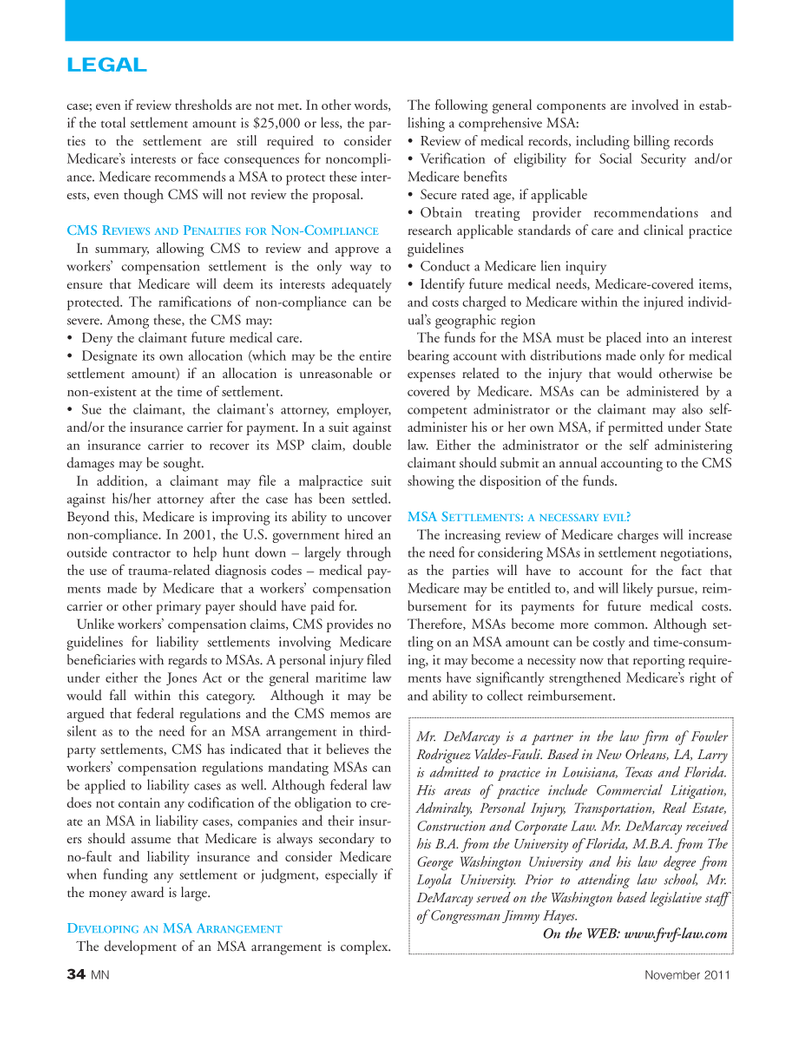
Page 34: of Marine News Magazine (November 2011)
Workboat Annual
Read this page in Pdf, Flash or Html5 edition of November 2011 Marine News Magazine
34MNNovember 2011case; even if review thresholds are not met. In other words, if the total settlement amount is $25,000 or less, the par-ties to the settlement are still required to consider Medicare?s interests or face consequences for noncompli- ance. Medicare recommends a MSA to protect these inter- ests, even though CMS will not review the proposal. CMS REVIEWSAND PENALTIESFOR NON-COMPLIANCEIn summary, allowing CMS to review and approve a workers? compensation settlement is the only way to ensure that Medicare will deem its interests adequately protected. The ramifications of non-compliance can be severe. Among these, the CMS may: Deny the claimant future medical care. Designate its own allocation (which may be the entire settlement amount) if an allocation is unreasonable or non-existent at the time of settlement. Sue the claimant, the claimant's attorney, employer, and/or the insurance carrier for payment. In a suit against an insurance carrier to recover its MSP claim, double damages may be sought. In addition, a claimant may file a malpractice suit against his/her attorney after the case has been settled.Beyond this, Medicare is improving its ability to uncover non-compliance. In 2001, the U.S. government hired an outside contractor to help hunt down ? largely through the use of trauma-related diagnosis codes ? medical pay- ments made by Medicare that a workers? compensation carrier or other primary payer should have paid for. Unlike workers? compensation claims, CMS provides no guidelines for liability settlements involving Medicare beneficiaries with regards to MSAs. A personal injury filed under either the Jones Act or the general maritime law would fall within this category. Although it may be argued that federal regulations and the CMS memos are silent as to the need for an MSA arrangement in third- party settlements, CMS has indicated that it believes the workers? compensation regulations mandating MSAs can be applied to liability cases as well. Although federal law does not contain any codification of the obligation to cre- ate an MSA in liability cases, companies and their insur-ers should assume that Medicare is always secondary to no-fault and liability insurance and consider Medicare when funding any settlement or judgment, especially ifthe money award is large. DEVELOPINGAN MSA ARRANGEMENTThe development of an MSA arrangement is complex. The following general components are involved in estab- lishing a comprehensive MSA: Review of medical records, including billing records Verification of eligibility for Social Security and/or Medicare benefits Secure rated age, if applicable Obtain treating provider recommendations and research applicable standards of care and clinical practice guidelines Conduct a Medicare lien inquiry Identify future medical needs, Medicare-covered items, and costs charged to Medicare within the injured individ- ual?s geographic region The funds for the MSA must be placed into an interest bearing account with distributions made only for medicalexpenses related to the injury that would otherwise be covered by Medicare. MSAs can be administered by a competent administrator or the claimant may also self-administer his or her own MSA, if permitted under State law. Either the administrator or the self administering claimant should submit an annual accounting to the CMSshowing the disposition of the funds. MSA SETTLEMENTS : ANECESSARYEVIL ?The increasing review of Medicare charges will increase the need for considering MSAs in settlement negotiations,as the parties will have to account for the fact that Medicare may be entitled to, and will likely pursue, reim- bursement for its payments for future medical costs. Therefore, MSAs become more common. Although set- tling on an MSA amount can be costly and time-consum-ing, it may become a necessity now that reporting require- ments have significantly strengthened Medicare?s right of and ability to collect reimbursement. LEGALMr. DeMarcay is a partner in the law firm of Fowler Rodriguez Valdes-Fauli. Based in New Orleans, LA, Larry is admitted to practice in Louisiana, Texas and Florida. His areas of practice include Commercial Litigation, Admiralty, Personal Injury, Transportation, Real Estate, Construction and Corporate Law. Mr. DeMarcay received his B.A. from the University of Florida, M.B.A. from The George Washington University and his law degree from Loyola University. Prior to attending law school, Mr. DeMarcay served on the Washington based legislative staff of Congressman Jimmy Hayes. On the WEB: www.frvf-law.com MN#11 (32-49):MN 2011 Layouts 10/27/2011 9:40 AM Page 34

 33
33

 35
35
